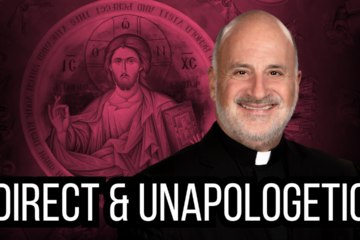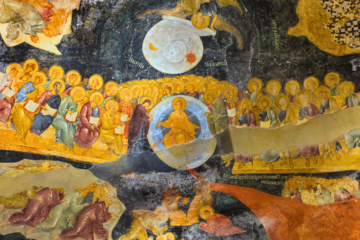Is marriage a path to sanctity and holiness? Upon seeing an article with a title containing the word “holiness,” one would think that the article discusses monastery life, or a life devoted to the Lord Jesus Christ and the service of His Church. However, in the Orthodox Church, marital life is also a holy life, as marriage is a sacrament (mysterion); it carries the sanctifying and purifying grace of the Holy Spirit. Marital life is a grace-filled experience of God’s Kingdom, an experience that begins with the priest’s announcement at the Wedding service: “Blessed is the Kingdom of the Father, of the Son, and of the Holy Spirit.”
The late blessed Elder Aimilianos of Simonopetra Monastery in Mount Athos vividly summarizes this experience of the Kingdom by saying that, “marriage, then, like monasticism, is a longing for the infinite; it is not the satisfaction of a biological drive, but an orientation of the self toward the eschaton. Marriage is a journey, an ascent toward the perfection of paradise, which is, as we have said, a place that we have already entered and into which we continue to progress” (The Way of the Spirit, p. 355).
This teaching of the Church about holy marriage is confronted by the contemporary society’s ideology about materialism and consumerism, including all its legislative, economic, sociological, philosophical, and technological facets. The current social ideology about marriage most often promotes self-satisfaction as a path to attain individual happiness, which is viewed by society as a “human right” to be upheld and advocated. However, the Church preaches that marriage is a life in Christ, involving carrying the Cross of sacrifice, emptying oneself for the other, and forgiving each other. This article presents marriage as a living Christian experience of unity and reconciliation in Christ, leading to an everlasting joy.
Marriage as Life in Christ
The Lord Jesus Christ tells us that “where two or three are gathered together in My name, I am there in the midst of them” (Matthew 18:20). When a man and a woman come together in the sacrament of marriage, Christ is in their midst. By the sacramental grace of Holy Matrimony, the couple are not just united to each other in Christ, but also united to Christ. They work together for the salvation of their souls and their children. In this way, they are revealed as an icon of Christ and the Church (Ephesians 5:32). When the husband and wife realize this, they show forth Christ in their lives, or as Elder Aimilianos puts it, they turn into a “theophany” (The Church at Prayer, p. 123), presenting Christ to their social surroundings.
This is all the work of the Holy Spirit in them, the Spirit that transfigures and deifies them in their connubial life. The sacrament of marriage helps man and woman become “partakers of the divine nature” (2 Peter 1:4), of the grace of divine love. This divine love is Christ Who is Love, Who sacrifices Himself for His loved ones, Who empties Himself, and Who washes the feet of the other in the humility of love. “But whoever keeps His word, truly the love of God is perfected in him. By this we know that we are in Him” (1 John 2:5). Whoever keeps the Word of God, whoever believes and puts his or her belief into practice through honest deeds, discovers the utmost, perfect, true love, and is saved by the grace of God. Thus, divine love cements the nuptial union, and the man and woman become one body in Jesus Christ. This divine love is actually the Divine Eucharist, the Holy Body and Blood of Jesus Christ that unites them together as one body.
What does oneness in Christ mean? It means believing in the Christ as the only Savior of the family. It also means thinking not as “I,” but as “we.” It means working together as a team rather than individually, and jointly mediating differences, conflicts and difficulties that arise. This unison demands effort, attention, willingness, sacrifice, patience, learning, and prayer. After all, oneness is a gift from God that grows with love.
Our Savior Jesus Christ is the perfect Love that is before the creation of the world. As St. Gregory the Theologian points out: “Marriage is the key that opens the door to discover chastity and perfect love” (Moral Poems, section II, PG 37:541-542). Accordingly, marriage in Christ is a path of love and salvation. Through this path, He showed us His love, as He showed His glory to the disciples in the marriage at Cana and with the disciples of Emmaus. The experience of this divine love remolds us, purifies us and makes us repent, so we can grow in the love of God. Hence, the earthly love that we begin experiencing in our marital life is transfigured into a purer love, the infinite love of Christ. This is man’s and woman’s way to salvation. What a great mystery it is, this mysterion of Christ and the Church!
Marriage as Unity in Christ
Marriage is a lifelong journey of discovery and love. It is a journey the husband and wife decide to embark on, cooperating with each other, helping each other, until they reach their common goal: the Kingdom of God. For marriage is a bridge, a journey, a road, a progression that “starts out from the earth and ends in heaven” (Elder Aimilainos, The Church at Prayer, 118). This journey has some joyful times and other troublesome times. The joyful times include experiencing consolations and witnessing beautiful things like the growth of children, while the other regular times include the fatigue that comes with facing the challenges of leading a family, raising children, paying dues, physical pain from various deceases, and surprising unpleasant events that might come up such as the loss of one’s job.
Throughout this journey, the husband and wife get to know each other with great transparency: their strengths and weaknesses, values, orientations, dreams, ambitions, differences, ways of managing everything from material things to intimate relations and parental relationships. Thus, they walk together on this path, getting closer and closer to each other, understanding the heart of each other, and becoming more united in and by Christ.
This unity in love is cemented by a deep commitment to serving the other and learning to love the other despite personality differences. By the grace of God, we increasingly earn this love that is ready to sacrifice for the other without egotism, the love that makes our partner’s wishes a priority. With dedication, the human being is healed from his or her passions, weaknesses, and egotism. The husband and wife become just as God intended them to be: patient, kind, and loving.
Marriage as Reconciliation in Christ
Conflicts are unavoidable in marital life because every human is unique and possesses free will. It is impossible for a human not to fall, sin, and hurt the other person with his or her words and behavior, even if he had well prepared for this journey. For this reason, it is essentially necessary, especially in our day and age, for the couple to have one spiritual father, guiding them, advising them, and praying for them, and that through his priestly grace, they may earn forgiveness of sins.
The sacrament of marriage is strengthened and lived through prayer, confession, and walking according to the commandments of the Lord, so that the Holy Spirit guides the couple on the journey, sanctifying them. In this way, marriage unveils itself as a sacrament, because in it the Kingdom of God becomes a living experience on earth.
Whoever intends to marry has certain expectations about the other, expectations that tend to be sometimes idealistic and unrealistic with regards to the other’s weaknesses and attitudes. The intimacy in marital relationships does not just involve physical nudity but also spiritual and psychological vulnerability. During the first three years of marriage, one spouse discovers the other’s weaknesses and all that he or she carries from an unbalanced upbringing, bad life experiences, various hidden passions, psychological distresses, and the degree of one’s inclinations and disposition towards consumerism, individualism, and worldly spirit.
These are the inclinations of our distorted human passions, or the fallen, pathological pleasures in ourselves, like egotism, greed, anger, laziness, coldness, despair, jealousy, and avarice. They spring “from within, out of the heart of men” (Mark 7:21). This shocking realization of our own sinful inclinations, revealed to us through the other’s criticism, and the realization of the spouse’s sinful passions, troubles one’s inner balance and jeopardizes the marital relationships. This turmoil brings into play aggressive emotions like a winter storm. Accordingly, instead of seeking refuge in God, the husband and wife may back away from dealing with their deteriorating marital life. However, marriage is not like a product purchasing contract and policy, with the option of returning the item or exchange it in case one discovers a kind of malfunctioning in the item purchased. If we may borrow the words from the business world, marriage is a final deal, with no refund, return, or exchange.
How then can the spouses mediate the differences that arise, before turning into conflicts? What is the way, then, that reveals marriage as a life of holiness and peace? The way is through returning to the Founder of the gift of marriage and its Giver, God Who is the Spring of mercy, love, and tenderness. God has granted Christians another sacrament that accompanies the life of married people and comforts them. This other essential sacrament is the sacrament of repentance and confession, the sacrament that heals all wounds by the effect the grace of the Holy Spirit and with the mediation of the spiritual father. The husband and wife choose one spiritual father capable of guiding them on the path to sanctity, love, prayer, patience, and endurance. It is the grace of the Holy Spirit that heals the wounds of their tiring conflicts and releases them from their slavery to sin, giving them patience, vigilance, respect, acceptance of the other, endurance of difficulties, peace, and divine love. It is the life-giving and healing Cross of Jesus Christ.
Why should we take shelter in Jesus Christ and His Cross? In the Orthodox Wedding service, spouses do not make vows to each other, because the spouses’ primary commitment is to Christ, He Who blesses the union of the couple by the present priest. This union is a gift bestowed by God on the husband and wife.
Accordingly, when the husband and wife receive forgiveness from God and taste God’s infinite love, they turn to each other, as do thankful slaves whose merciful master frees them from their debts. The marital journey to holiness is indeed a journey of life in its fullness. It is a path of repentance, a ladder ascending to heaven, walked upon by the man and woman with fingers intertwined, so if one falls, the other snatches the fallen with the power of Christ. Needless to say that the Church’s teaching about marriage remains just beautiful prose, unless Christians catch the winds of faith in their sails and set their ship toward the lighthouse of Christ leading to the harbor of salvation. Christians are called to put their faith to work, in order to witness Christ Incarnate and Resurrected as a living Light for the world, to Whom be glory forever and ever. Amen.
Source: pemptousia.com




0 Comments